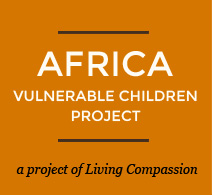Saturday morning first thing Dave left for the Water Affairs Department downtown to find Mr. Chaila. The two had an appointment to go together out to Kantolomba to see about the well.
When Dave arrived Mr. Chaila was waiting and the drillers were just returning from their breakfast. The men gathered under the trees outside the office for an energetic conversation in Bemba, after which the drillers piled into and onto a gigantic boom-truck and headed for the edge of town. Dave and Mr.Chaila followed in Mr. Chaila's pick-up.
Their first stop was a farm in the bush where they unloaded the boom-truck. It was a lovely place, far away from the noise and pollution of the city, with wonderful views all around. While the men worked, Dave sat on an ant-hill to enjoy the breeze and the beautiful silence. One of these days we hope to have a farm of our own. There is something special about the African bush, especially for people who love quiet.
When the work was finished, everyone piled back onto the trucks for the drive to Kantolomba. Once they arrived it was just a matter of minutes to fire up the huge compressor and begin blowing out the well, as they had the day before. The idea is to use compressed air to clear those water passages at the bottom of the well that have become clogged with silt. On Friday the head driller suggested the unpleasant possibility that the well casing could be cracked, leaking silt into the well. Mr. Chaila had come to test this possibility.
At first the property was nearly deserted. The school is not open on Saturdays, and the building crew had been laid off for a day because they had run out of bricks. As soon as the motor began running, however, a crowd of children appeared to witness the spectacle of the water spewing out of the ground--not to mention the thrill of such a giant vehicle in their yard!
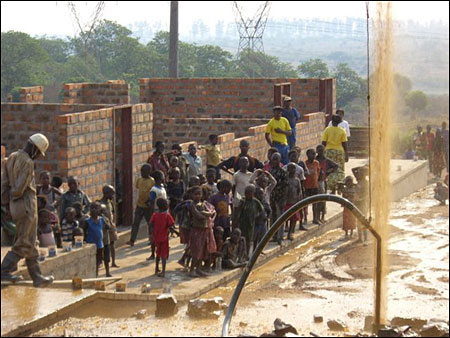
Watching the well water.
Once the compressor was running, Mr. Chaila carefully adjusted the pressure of the air being forced down the well. It was possible that the problem from the day before was caused by too much pressure. For thirty minutes Dave, Mr. Chaila, and the drillers sat on the steps of the half-built community center to watch what the well would do. The water was muddy at first. If it stayed muddy, as it had before, this would suggest a problem with the well. If cleared over time, this would prove there was no problem. Dave held his breath. It took almost all of the thirty minutes, but gradually, the water cleared. Dave gave a great big, silent cheer. You simply can't imagine how much work, effort, and money was riding on this–and how many months of delay.
We have a good well! Even better, we have a lot of water; it appears we have plenty to serve the people of Kantolomba, as we have been hoping and praying.
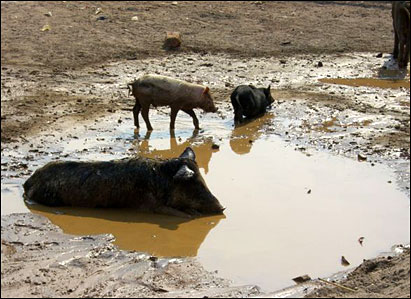
Some of our neighbors enjoying the clean, refreshing water that came out of the well.
As the water cleared, people began to gather to catch it as it fell to the earth. One young man, a bricklayer, came to Dave with two cups of water, one from our well and one from the nearest community spigot. "This is not good," he said after sipping the community water, and threw it to the ground. Then he swallowed the well water in one gulp, and held up the empty cup, smiling. "This water is good," he said. "Cheers."
Of course the people of Kantolomba are used to the filthy, polluted water. Some of them know it is causing the diarrhea that is killing them and their children, but they have no choice about drinking it. Human beings must drink water. What we are acutely aware of is that the ability to drink good water will save lives. Seven out of ten children in Kantolomba die before the age of five, many from diarrhea. Those statistics are going to change, from medical care, yes, and from the ability to drink pure water.
(Thanks once again to all of you making this possible.)
Dave and Mr. Chaila arranged to meet on Monday morning to take the next step. We need to test the capacity of the well so we know what size pump to buy. After that we can hire someone here to install it.
Meanwhile, Jen was meeting with Andrew (Steve's assistant at the building department) and Gaudencia. The building project involves all sorts of financial and legal complexities that need to be understood, and the three plugged away until all were clear about them. Once they were finished, Jen called Muyunda, our loyal taxi driver, and set out to Kantolomba to meet Dave.
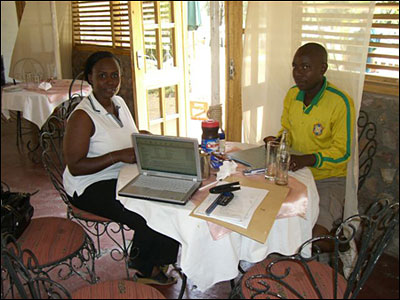
Gaudencia and Andrew.
A community meeting had been planned to discuss the microfinance program. We had realized over the course of the two previous days that we don't have a lot to say at this point. We don't have much experience in creating a microfinance program--only the experience of talking to the few experts we know. As with nearly everything in Africa, we're going to have to figure it out and make it up as we go, the first time. Even so, we felt the meeting would be a good way for us to connect with the people who are not involved as intimately as the women providing the food program, but who are participating in the project as garbage collectors or construction workers and are gradually growing closer to the Living Compassion "family."
The meeting went well. About forty people showed up, thirty women and ten men. We explained, with Theresa translating, that we have a lot of hope that the microfinance program will provide support for the people of Kantolomba to learn to support themselves. We described our current vision to them, that we will ask them to form groups that share an interest (carpentry, growing vegetables, etc.), and then loan money to the groups. We told them that we would like to begin with a series of classes to teach them basic business skills and money management. Then we asked for their questions and comments.
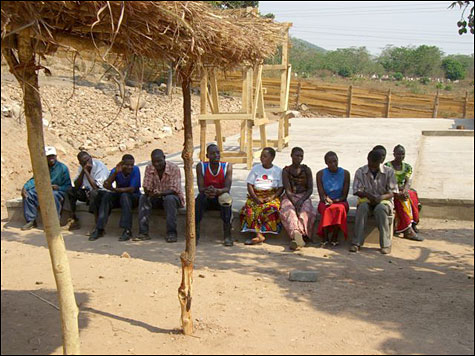
Some of the folks at the meeting.
People were shy to speak, and the meeting would have ended there had it not been for an earnest, sincere, young man named Peter. He spoke for everyone, raising questions that most likely were on everyone's mind. He wanted to know if we would assist them in learning English. English is the language of commerce here, and it's hard to get very far without it. We told him yes, that we had already started a day-time class for the adults in the compound, and we promised that we would find a time for another class that could serve the people working on the building project, who cannot attend during the day. He asked if there is a possibility jobs would be created that they could apply for once the medical clinic was finished. We assured him that the jobs would go, as they have from the beginning, to those with the most commitment and the greatest desire to serve. "I am one of those," said Peter. "Remember me!"
Peter's other questions had to do with the needs of the people of Kantolomba and Living Compassion's willingness to help. Mostly we could only tell him yes, that we want to help as much as we are able, but that we must all do this together. It will be up to the people of the compound to discover the solutions that they will need. They are the only ones in the position to do that: our role as we see it, we told them, is to help facilitate the process and to provide resources when able. And more, we explained that we ourselves come to Kantolomba only for that, to add ourselves to their community, to be in relationship with them and to learn with them as they discover how to care for themselves.
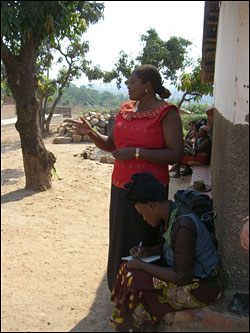
Theresa translating.
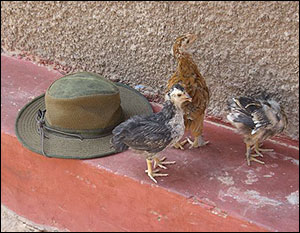
Some friends gather around Dave’s hat after the meeting.
After the meeting, we came back to Castle Lodge for a rest, then went to dinner at Michelangelo's with Theresa and Godfrey, our young computer genius friend who has been helping us with all things technical from the very beginning of our work in Ndola. Since we last saw him, Godfrey lost his mother to a blood pressure induced stroke. When we saw her on a recent visit, she was a vital, vibrant, passionate woman, full of hopes and dreams for the work she was doing with HIV/AIDS awareness and community support. Her passing is a huge loss. It is hard to realize she's gone.
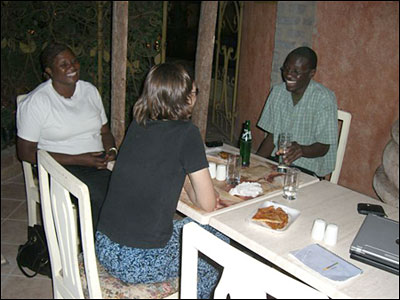
Jen, Theresa and Godfrey
